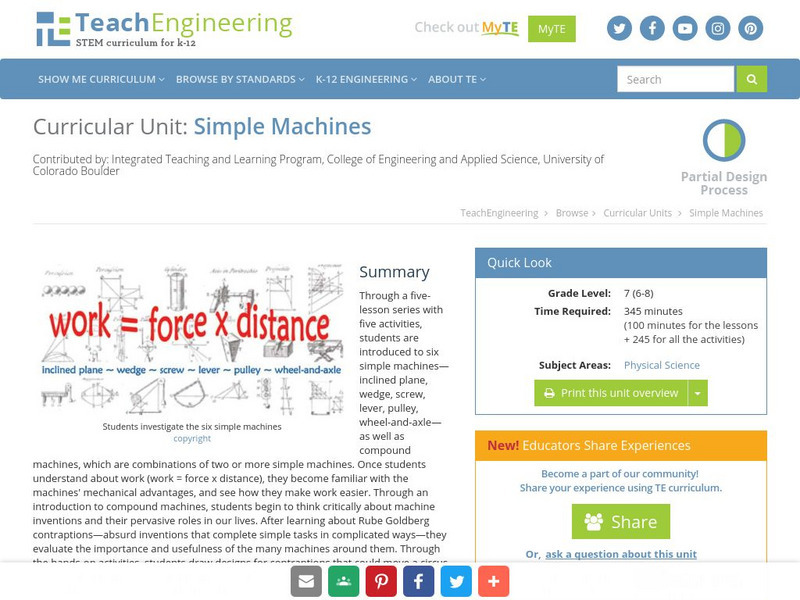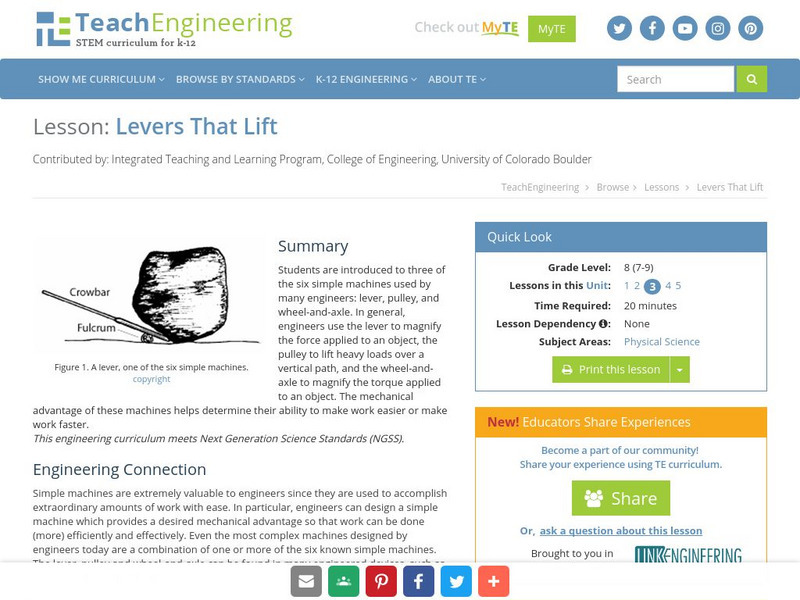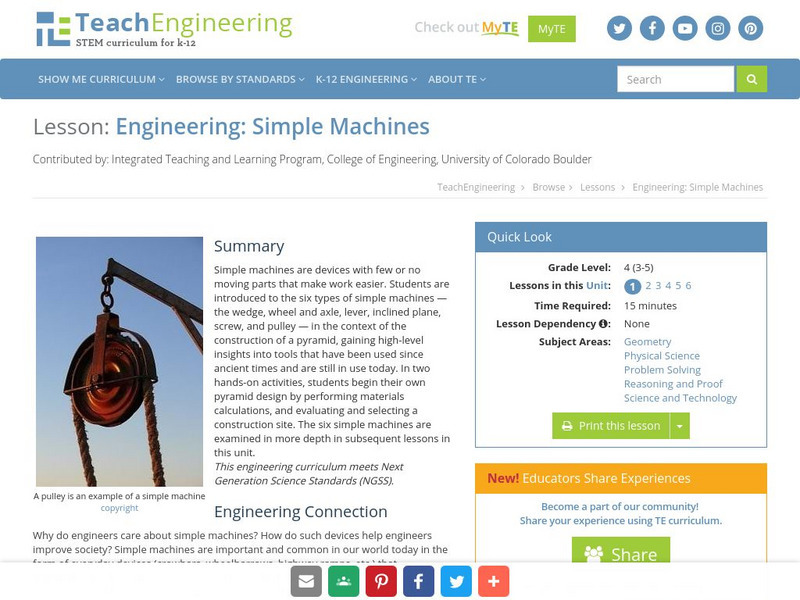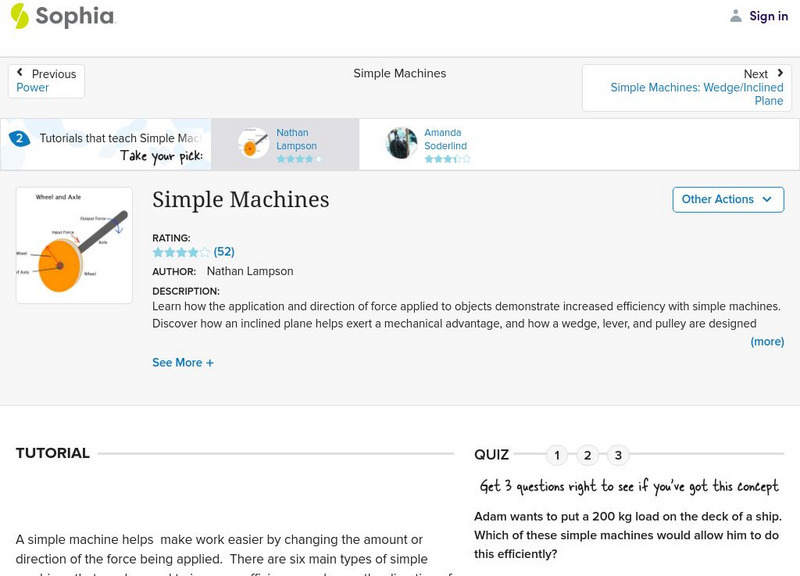Integrated Publishing
Integrated Publishing: Pulley Mechanical Advantage
Good illustrations and explanations for finding the mechanical advantage of pulley systems.
TeachEngineering
Teach Engineering: Machines and Tools, Part Ii
In this activity, students gain first-hand experience with the mechanical advantage of pulleys. Students are given the challenge of helping save a whale by moving it from an aquarium back to its natural habitat into the ocean. They set...
Science Struck
Science Struck: Simple Machines: Pulley Systems
Describes some history of the pulley, how it works, the formula for calculating its mechanical advantage, types of pulley systems, and some applications of pulleys.
TeachEngineering
Teach Engineering: Simple Machines
Through a five-lesson series with five hands-on activities, students are introduced to six simple machines - inclined plane, wedge, screw, lever, pulley, wheel-and-axle - as well as compound machines, which are combinations of two or...
CK-12 Foundation
Ck 12 Exploration Series: Simulations: Physics: Block and Tackle
[Free Registration/Login Required] A video module where students learn about the relationship between force, work, energy, and mechanical advantage using a simple machine.
Other
New Path Learning: Virtual Lab: Exploring Pulleys
Investigate how changing the load, number of pulleys, and the size of the person affect the function of a pulley system. Students can record their observations on a data table.
Sophia Learning
Sophia: Simple Machines: Pulley: Lesson 2
This lesson will explain how to calculate the mechanical advantage of a pulley system. It is 2 of 3 in the series titled "Simple Machines: Pulley."
Sophia Learning
Sophia: Simple Machines: Pulley: Lesson 3
This lesson will explain how to calculate the mechanical advantage of a pulley system. It is 3 of 3 in the series titled "Simple Machines: Pulley."
CK-12 Foundation
Ck 12: Physical Science: Pulley
[Free Registration/Login may be required to access all resource tools.] What a pulley is and the three basic types, and the mechanical advantage of a pulley.
TeachEngineering
Teach Engineering: Simple Machines From Pyramids to Skyscrapers
Simple machines are devices with few or no moving parts that make work easier, and which people have used to provide mechanical advantage for thousands of years. Students learn about the wedge, wheel and axle, lever, inclined plane,...
TeachEngineering
Teach Engineering: Levers That Lift
This lesson introduces students to three of the six simple machines used by many engineers: the lever, the pulley, and the wheel-and-axle. In general, engineers use the lever to magnify the force applied to an object, the pulley to lift...
Other
University of Arkansas: Simple Machines
A thorough discussion of all the simple machines, beginning with some thoughts on mechanical advantage and conservation of energy. Very complete. Move down to the section that interests you.
TeachEngineering
Teach Engineering: Engineering: Simple Machines
Simple machines are devices with few or no moving parts that make work easier. Students are introduced to the six types of simple machines - the wedge, wheel and axle, lever, inclined plane, screw, and pulley - in the context of the...
Curated OER
Integrated Publishing: Pulley Mechanical Advantage
Good illustrations and explanations for finding the mechanical advantage of pulley systems.
Curated OER
Integrated Publishing: Pulley Mechanical Advantage
Good illustrations and explanations for finding the mechanical advantage of pulley systems.
Curated OER
Integrated Publishing: How Mechanical Advantage Is Used
Describes how pulley systems are used in the real world, including the role of the mechanical advantage in selecting the proper pulley system.
Khan Academy
Khan Academy: Simple Machines and How to Use This Tutorial
There are six simple machines. They are as follows: lever, wheel, pulley, incline plane, wedge, and screw. This tutorial will cover the first three.
Curated OER
Integrated Publishing/block & Tackle (Or Pulley)
Very substantial four-page article on how the block & tackle works. (It's a simple machine -- a pulley.) Lots of illustration. Mechanical advantage, formulae, solved problems, all here. Good source for info.
Curated OER
Integrated Publishing/block & Tackle (Or Pulley)
Very substantial four-page article on how the block & tackle works. (It's a simple machine -- a pulley.) Lots of illustration. Mechanical advantage, formulae, solved problems, all here. Good source for info.
Curated OER
Integrated Publishing/block & Tackle (Or Pulley)
Very substantial four-page article on how the block & tackle works. (It's a simple machine -- a pulley.) Lots of illustration. Mechanical advantage, formulae, solved problems, all here. Good source for info.
PBS
Pbs Teachers: Secrets of Lost Empires I Colosseum
Discover how to use pulleys to change the direction of force, compare different pulley designs and discuss the advantages and disadvantages of a pulley.
TeachEngineering
Teach Engineering: Simple Machines and Modern Day Engineering Analogies
Students apply the mechanical advantages and problem-solving capabilities of six types of simple machines (wedge, wheel and axle, lever, inclined plane, screw, pulley) as they discuss modern structures in the spirit of the engineers and...
The Franklin Institute
Spotlighting Simple Machines
Simple machines such as inclined planes in wedges and screws are explained.
Sophia Learning
Sophia: Simple Machines: Lesson 2
This lesson will introduce the six types of simple machines and show how machines can increase efficiency by reducing work input needed. It is 2 of 2 in the series titled "Simple Machines."














